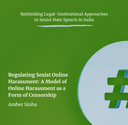Posts
CIS Comments on the Phase III of E-Courts draft policy
— by Aman Nair, Arinjay Vyas, Pallavi Bedi, Garima Saxena — last modified Jun 03, 2021 12:33 PM
Beyond Public Squares, Dumb Conduits, and Gatekeepers: The Need for a New Legal Metaphor for Social Media
— by Amber Sinha — last modified May 31, 2021 10:23 AMIn the past few years, social networking sites have come to play a central role in intermediating the public’s access to and deliberation of information critical to a thriving democracy. In stark contrast to early utopian visions which imagined that the internet would create a more informed public, facilitate citizen-led engagement, and democratize media, what we see now is the growing association of social media platforms with political polarization and the entrenchment of racism, homophobia, and xenophobia.

Regulating Sexist Online Harassment as a Form of Censorship
— by Amber Sinha — last modified May 31, 2021 09:56 AMThis paper is part of a series under IT for Change’s project, Recognize, Resist, Remedy: Combating Sexist Hate Speech Online. The series, titled Rethinking Legal-Institutional Approaches to Sexist Hate Speech in India, aims to create a space for civil society actors to proactively engage in the remaking of online governance, bringing together inputs from legal scholars, practitioners, and activists. The papers reflect upon the issue of online sexism and misogyny, proposing recommendations for appropriate legal-institutional responses. The series is funded by EdelGive Foundation, India and International Development Research Centre, Canada.
Rethinking Data Exchange & Delivery Models
— by Pallavi Bedi, Amber Sinha — last modified Apr 08, 2021 06:36 AMComments and recommendations to the Guidelines for “Influencer Advertising on Digital Media”
— by Torsha Sarkar and Shweta Mohandas — last modified Apr 05, 2021 09:58 AMIn February, the Advertising Standards Council of India (ASCI) had issued draft rules for regulation of digital influencers, with an aim to "understand the peculiarities of [online] advertisements and the way consumers view them", as well as to ensure that: "consumers must be able to distinguish when something is being promoted with an intention to influence their opinion or behaviour for an immediate or eventual commercial gain". In lieu of this, we presented our responses.
Recommendations for the Covid Vaccine Intelligence Network (Co-Win) platform
— by Pallavi Bedi — last modified Mar 25, 2021 01:14 PMThe Competition Law Case Against Whatsapp’s 2021 Privacy Policy Alteration
— by Aman Nair and Arindrajit Basu — last modified Mar 24, 2021 04:12 PMHaving examined the privacy implications of Whatsapp's changes to its privacy policy in 2021, this issue brief is the second output in our series examining the effects of those changes. This brief examines the changes in the context of data sharing between Whatsapp and Facebook as being an anticompetitive action in violation of the Indian Competition Act, 2002.
Regulating Sexist Online Harassment: A Model of Online Harassment as a Form of Censorship
— by Amber Sinha — last modified Mar 11, 2021 04:14 AMAmber Sinha wrote a paper on regulating sexist online harassment, and how online harassment serves as a form of censorship, for the “Recognize, Resist, Remedy: Addressing Gender-Based Hate Speech in the Online Public Sphere” project, a collaborative project between IT for Change, India and InternetLab, Brazil.
New intermediary guidelines: The good and the bad
— by Torsha Sarkar — last modified Mar 15, 2021 01:52 PMIn pursuance of the government releasing the Information Technology (Intermediary Guidelines and Digital Media Ethics Code) Rules, 2021, this blogpost offers a quick rundown of some of the changes brought about the Rules, and how they line up with existing principles of best practices in content moderation, among others.
CIS comments on the Revised Non Personal Governance Framework Report
— by Pallavi Bedi, Anubha Sinha and Aman Nair — last modified Mar 22, 2021 05:39 AMDocument Actions


